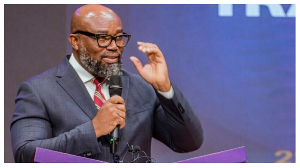The overnight riches of young politicians in Ghana coupled with the wealth they flaunt after gaining office, are to blame, among other factors, for the worsening moral decadence in Ghana, epitomised by the recent murder of a 10-year-old boy by his two teenage friends at Kasoa, Central Region, for alleged get-rich-quick ritual purposes, the Executive Director of the Media Foundation for West Africa (MFWA), Mr Sulemana Braimah, has posited.
In his view, the failure by the media, specifically, and society, in general, to question the source of wealth of young politicians, has contributed to the menace, which, in his view, is now coming to a head.
The teenage suspects, Felix Nyarko, 15, and Nicholas Kini, 17, allegedly conspired to kill the Class Four pupil of the Maranatha School, Ishmael Mensah, at about 10 a.m. on Holy Saturday.
They hid the body in an uncompleted building and were to transport it to a Juju man under the cover of darkness, for the money ritual.
They are to appear before the Ofaakor district today, Monday, 6 April 2021.
Commenting on the media’s role in all of this, Mr Braimah said told Class FM on Monday that: “I think that we have to look at it as a collective national failure”, explaining: “A failure in our morals, as a country; a failure in our collective attitudes as a country”.
He admitted: “Yes, the media certainly have a role to play in terms of educating people about morals and values and so on; that we should do, regardless of whether these things are happening or not – that’s the fundamental thing that the media have a responsibility to do”.
Beyond that, however, Mr Braimah complained: “I think the other thing that the media have to do which we haven’t been doing over the years, is this whole issue about unexplained wealth: people suddenly, either they claim they are pastors, they claim they are business people or whatever, and within a space of one year or two, are flaunting multiple cars, multiple mansions and so on and so forth and no one cares to interrogate: ‘How did they make this money?’, ‘How much taxes have they been paying to the state and so on and so forth?’”
“Now, the other side is our politicians. We know the big mansions, the structures coming up at the Cantonments, East Legon, Airport residential area and so on and so forth.
“A lot of these belong to politicians, some of whom are young people; if we should look at ‘young’ to be, maybe, somebody under the age of 40, and again, we don’t ask: ‘How did they come by the money?’” he observed.
Demonstrating his concerns further, Mr Braimah said: “During elections, parliamentary primaries, presidential primaries, the election itself, look at the amount of money that people pump in in order to become candidates of political parties and in order to become Members of Parliament”.
“Where do they get these monies from and how are they intending to recover these monies that they are spending?” he wondered, adding: “I think, as a country, we have had leadership failure in this area, and I think, over the years, whether it is NDC leaders [or] NPP leaders, they have all been culpable of this particular practice that has then led us into the moral decadence that is leading to these kinds of horrific incidents that we are witnessing”.
In his view, “it appears everyone wants to make money quick and regardless of how the money will be made: if it is about stealing, if it is about killing, if it is about corruption; people are eager just to make money and it appears that the only way you can be somebody in this country, is to have money and, so, people are eager”.
To him, “people go into politics these days, really, not for any values, not for the commitment to develop our country, it is about making money and having power”.
“And, so, I think as media, we have a major and massive responsibility to tackle this issue. And, of course, people will tell you that it’s not as though we, those of us in the media, are also saints. We also are part of the problem”.
General News of Thursday, 8 April 2021
Source: classfmonline.com













